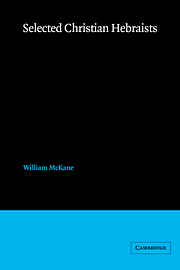Book contents
- Frontmatter
- Contents
- Preface
- List of abbreviations
- Introduction
- 1 The foundations
- 2 Andrew of St Victor
- 3 William Fulke and Gregory Martin
- 4 Richard Simon
- 5 Alexander Geddes
- Conclusion
- APPENDICES
- Notes
- Select bibliography
- General index
- Index of modern authors
- Scripture references
- Index of early Christian Literature
5 - Alexander Geddes
Published online by Cambridge University Press: 18 December 2009
- Frontmatter
- Contents
- Preface
- List of abbreviations
- Introduction
- 1 The foundations
- 2 Andrew of St Victor
- 3 William Fulke and Gregory Martin
- 4 Richard Simon
- 5 Alexander Geddes
- Conclusion
- APPENDICES
- Notes
- Select bibliography
- General index
- Index of modern authors
- Scripture references
- Index of early Christian Literature
Summary
A century separates Richard Simon and Alexander Geddes, but they have much in common. Both were Roman Catholics with a Paris education which gave them mastery in the same departments of critical biblical scholarship. Both were biblical critics of the same kind; both were Hebraists and applied the ancient versions to the study of the Hebrew Bible. They were familiar with patristic literature and, in particular, were steeped in Jerome. They had decided aesthetic opinions on the translation of the Hebrew Bible and they regarded translation as a consummation of textual and linguistic scholarship. They set the same limits to the critical exegesis of the Hebrew Bible and neither was interested in the Christian exegesis of the Old Testament.
When the differences between them are reckoned, it ought to be said that whereas Simon holds that vernacular translations of the Bible for ecclesiastical use should be made from the Vulgate, Geddes sees virtue only in translations which are done from the original languages. Moreover, Geddes provides more evidence than Simon that he has wrestled with the practical problems of translating the Hebrew Bible: he has an awareness of the craft of translation as opposed to the theory. He discusses difficulties which arise for the workman at his bench; he knows the pinpricks which are associated with the job, the little problems which emerge and clamour for decisions.
The most important difference between Simon and Geddes lies in the range of their scholarly ambitions. Simon is the cool scholar who seeks freedom to pursue his critical investigations into the Hebrew Bible.
- Type
- Chapter
- Information
- Selected Christian Hebraists , pp. 151 - 190Publisher: Cambridge University PressPrint publication year: 1989

